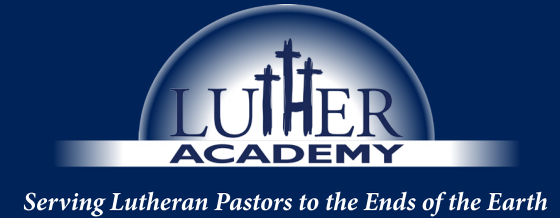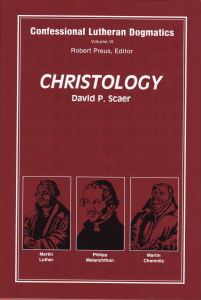
VI. Christology by David P. Scaer (113 pp., published 1989)
Biblical in its presentation, Christology describes the historic Christological controversies as well as more recent debates concerning the person of Jesus. Faithful to the historic and orthodox understanding of the incarnation, the two natures in Christ, the atonement and the resurrection, Scaer’s treatment is at the same time fresh and persuasive.
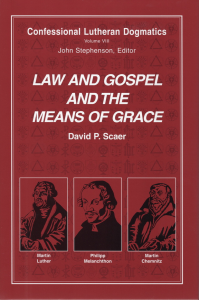
VIII. Law and Gospel and Means of Grace by David P. Scaer (238 pp., published 2008)
“The gospel creates faith, which in turn lays hold of Christ who is present in this proclamation, and by this faith the believer accepts the promises of eternal bliss with Him… Law confronts human beings in the condition of their sins and alienation from God, and gospel offers a completed salvation in Jesus Christ. Both are equally valid words of God, which when preached in tandem, make Christians aware that they are sinners and God’s redeemed children at the same time” [pp. 4 & 5]. A short excerpt from the book dealing with Law and Gospel from the confessional Lutheran point of view.
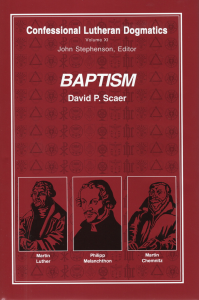
XI. Baptism by David P. Scaer (236 pp., published 1999)
An orthodox yet fresh presentation on the sacrament of Baptism. Dr. Scaer offers analyses both of the Roman Catholic and the Reformed views of Baptism, compares current Lutheran worship forms with historic Lutheran baptismal practice, and provides a thorough defense of infant Baptism. He provides the reader with a strong defense against those who would deny God’s work in this precious sacrament.
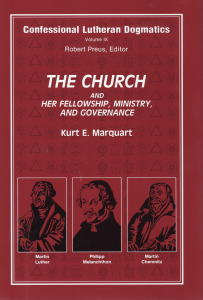
This book not only rehearses the controversies of the past regarding church and ministry, but addresses today’s issues as well. With a completely biblical and confessional perspective, Marquart divides his presentation into four parts: The Church, Church Fellowship, The Ministry, and Church Governance. Marquart’s description of the Holy Ministry provides a welcome corrective to current trends to redefine this office according to secular business and marketing.
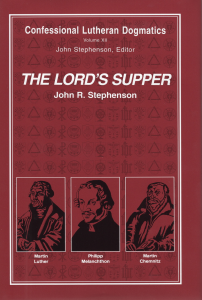
XII. The Lord’s Supper by John R. Stephenson (xv + 294 pp., published 2003)
A comprehensive study of the Lord’s Supper, drawing on scriptural and confessional resources to address key issues in the ecumenical context of the twentieth and twenty-first centuries. Stephenson draws richly from the writings of Luther, the Lutheran Orthodox dogmaticians, and modern confessional Lutheran theologians (especially Charles Porterfield Krauth, C. F. W. Walther, Herman Sasse, and Tom G. A. Hardt) in a treatment that is unabashedly Lutheran yet deals openly and forthrightly with new perspectives.
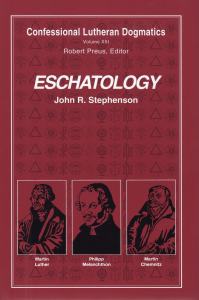
XIII. Eschatology by John R. Stephenson (176 pp., published 1993)
An excellent description of the biblical view of the end times as well as an historical overview of the various millennial views that have surfaced in the church over the last 2,000 years. Dr. Stephenson’s Eschatology is a breath of fresh air as it expounds the Christian view of the end times, a view which cannot be understood apart from orthodox Christology and incarnation theology.
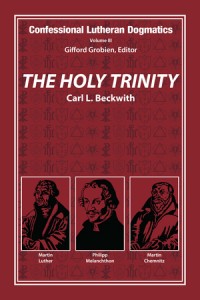
III. The Holy Trinity by Carl Beckwith (393 pp., published 2016)
This dogmatic resource is based upon the outline and thought pattern of the Lutheran Confessions. The series is strictly and consciously confessional in its presentation of doctrine and its assessment and analysis of modern theological trends throughout the Christian church.
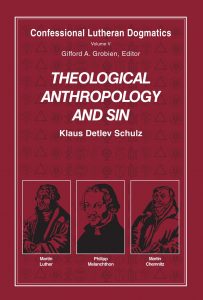
V. Theology Anthropology and Sin (310 pp., published 2023)
Contemporary descriptions of who humans are and what belongs to their humanity are diverse and always changing, according to what various groups or individuals imagine them to be. Against this plurality, treatments on anthropology demonstrate a longing for clarity that is able to set right confusions and error. Theological Anthropology and Sin, volume 5 of the Confessional Lutheran Dogmatics series, allows Scripture and theology to speak to this question, yielding a permanent and essential portrayal of the human’s nature and structure, identity, sex, and personhood–constants that can stand against the whims of human imagination and the spirit of the age. Klaus Detlev Schulz is professor of pastoral ministry and missions and director of international studies at Concordia Theological Seminary in Ft. Wayne, Indiana.
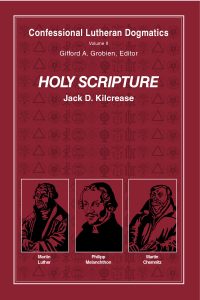
V. Holy Scripture (348 pp., published 2020)
Holy Scripture, volume 2 of the Confessional Lutheran Dogmatics series, seeks to explicate and defend the truthfulness of the Bible as well as its Christocentricity in response to the challenges of contemporary theology. This study appropriates the theological resources of Scripture and the Lutheran Confessions in order to counteract the destructive theological trends found in contemporary Catholicism, Evangelicalism, and theological Liberalism. By explicating and defending the scriptural principle of the Lutheran Reformation, this volume will equip readers to confess clearly both the unity of Scripture in Christ and the truthfulness of all that God has spoken in His historic revelation.
